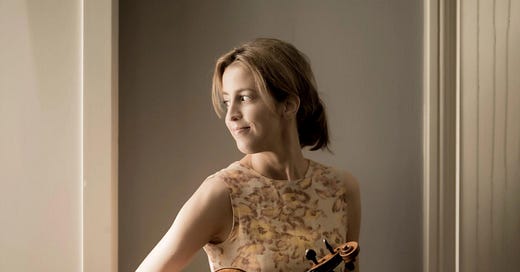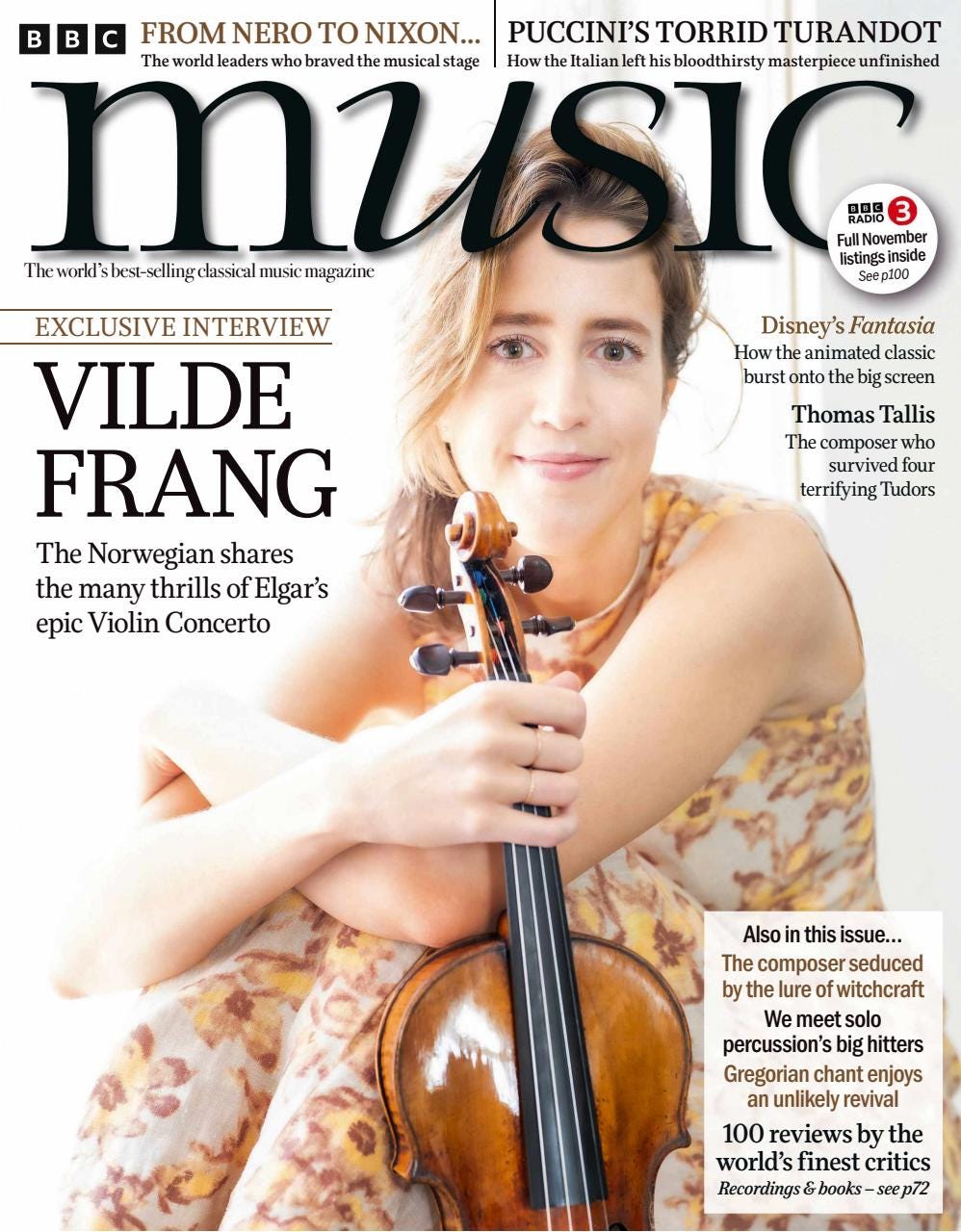‘If you play without a safety net, it makes you freer’ – an interview with Vilde Frang
OUTTAKES The Norwegian violinist describes the importance of risk, being receptive and trusting, and only ever trying to be yourself
My interview with Vilde Frang for the cover of the November issue of BBC Music Magazine has just come out, as she releases her sensational recording of the Elgar Violin Concerto with Robin Ticciati and Deutsches Symphonie-Orchester Berlin. She is currently touring the concerto, as well as the Stravinsky and Korngold ones – no one can accuse her of being lazy. But as I found out talking to her, she is not someone who makes life easy for herself – she spoke a lot about taking risks, and one can hear that in her playing. You can read that interview here, but there were some interesting quotes I didn’t have space for…
On playing the Elgar Violin Concerto
‘I was determined to get in a shape where I could play the piece without the score. Personally, playing with the score can limit me and make me more self-conscious. It’s a bit like swimming with armbands when you’re able to swim, or not taking the support wheels off your bike. If you play without a safety net, it makes you freer. It’s more risky, but it also it also leaves you with more freedom.
You’re on the highway on the way through the piece and there’s so much information, so if something happens, you can’t think ‘what was that’ because you just need to keep focus. When you come to the cadenza it’s so free and improvisational. You need to let go of the control and just let the impulses come to you.
I remember halfway down the first page of the concerto I’d barely started playing and I suddenly felt this huge wave of exhaustion. How am I going to get through this piece? I still have 40 minutes to go. Of course, you just keep on playing, and let the music take you, somehow, and it’s the best experience. There are certain pieces of music you achieve that – the Bach Chaconne or Schubert Fantasy, and the Elgar is especially capable of that sort of experience.’
On the pressure to be on social media
‘There are people who are brilliant of drawing towards an audience. It’s phenomenal if you have that capacity, and it’s needed, but it doesn’t mean that everyone has that. I am quite reluctant to do it because I never felt I was in my right element with social media and marketing. I realise one needs to project the classical world with a loudspeaker and draw in other people, but if one doesn’t feel it, and has a feeling that other people can do it better, we shouldn’t do it. I dread the feeling of trying to be someone else other than oneself. I think people immediately see through it. But there are many ways of doing social media. Steven Isserlis’s page, for example, is a treasure trove because he’s telling anecdotes about Rostropovich or Shafran. That’s exactly what social media is for. But very often, it’s self-promotion and I’m allergic to that kind of narrative.’
Staying open to life
‘You need to be open to life. Maybe some people are more sensitive than others and some have more lessons to learn. Some are luckier than others, but all the less fortunate things can get channelled through your work. You take it all in and it all comes out of the violin.’
Musicians aren’t the only musicians
‘I had a Russian ballet teacher who was very, ‘You must commit, you need to work harder,’ and it came to a head, but I would have loved to dance ballet. In my next life, if I’m lucky, I would like to come back as a dying swan. Ballet is similar to playing an instrument in that you see dancers who are musical, but there are also fantastic professional dancers who have no clue about music – they execute flawlessly, and it’s almost depressingly good to watch. Then there are there are dancers like Alina Cojocaru. She was at Covent Garden and now she’s at English National Ballet. Her partnership with her husband Johan Cobourg was legendary. Dance is all about musicality. There are so many people that are more musical than many classical musicians – even hobby musicians or comedians, where you can see they have a certain musicality.’
Working with orchestras
‘You will always enter situations as a soloist with new orchestras and conductors and the mindset you need is just to be receptive. It’s very much about trust and not control – that’s crucial. It’s not ‘Look at me, look at me now, I will give the lead.’ When you work with certain musicians, you know that there are things that don’t need to be discussed. It’s just like interacting with certain people in everyday life: you have a feeling they won’t pick up on the same signals, and it’s the same with music making.
If you don’t happen to agree with each other, it’s even more important to trust, because it’s very dangerous to be set in your ways. It basically blocks the entire process, and it only polarises, as we don’t have a lot of time to rehearse usually. I find the adaptability in British orchestras in particular so incredible. Even at the first rehearsal, they play like a concert. For them it’s just another day.’
The benefits of chamber music
‘Playing chamber music teaches me a lot about phrasing and to which extent one can be oneself. It’s always a balance that you need to search for in a chamber music setting – the feeling that one is just part of one organism. I always try to merge. That’s also what I try to achieve when I play with orchestras, too, but it’s much harder. Chamber music improves me as a musician.’





